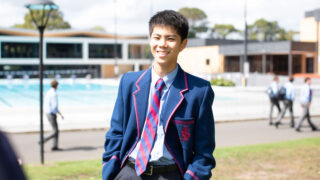Theory of Knowledge (TOK) is part of the core IB Diploma (IBDP) curriculum – and mandatory for all students. It can also be quite the challenge! We asked JEROME BARTY-TAYLOR, IB tutor at BartyED for expert advice on tackling the IB TOK.
What’s your background with IB TOK?
I’ve tutored the IB TOK for the last decade and previously served as an examiner in the subject. TOK “interventions” are often some of the most enriching short-term assignments. You’re able to help a young person make rapid progress and gain a new understanding of the world as well as themselves.
Teaching the subject also allows me to get to know our final year students better, which is a joy. Once upon a time, many moons ago, I was an IB TOK student myself, so I can always empathise with students who say they find the subject challenging or don’t understand its relevance to them.

Tell us more about the structure of the subject.
Theory of Knowledge is designed to get students to explore the nature of knowledge and the process of knowing. That sounds intimidating, but really it’s quite simple: students learn about how we know things, and the cultural, religious, scientific and ethical beliefs that underpin methodology and what we believe to be true. Basically, the course is designed to encourage students’ critical thinking and evaluation skills. In the so-called “post truth” age, there’s never been a more important subject.
There are two assessments: the exhibition and the essay. The exhibition is marked internally by the teacher and comprises 33 percent of the student’s grade; the essay is marked externally by IB examiners and counts for 66 percent.
There have been some changes to the TOK recently, right?
Like many IBDP subjects, the TOK underwent an overhaul of its curriculum and structure in 2019. Whereas students had previously been required to deliver an oral presentation, this has been replaced by the exhibition. This is a project where students present three objects that embody how concepts discussed in TOK are applicable to the world around them. Students trip up because the word count is extremely tight – only 300 words per object; through this, they must communicate philosophical complexity if they wish to score highly.
What tips can you offer students (and parents!)?
The TOK is certainly a challenging component of the IBDP, but there are simple ways students can get the most out of the experience, and even enjoy it! Organisation and time management are key. The essay prompts are released in September each year, so there’s no excuse for students not to get started early. As an “A” in TOK can deliver potentially two additional points on the IB Diploma, careful planning of the essay can make all the difference to a candidate’s profile when applying to top universities.
It’s important to prioritise clarity of thought and argument over trying to sound “clever” or “deep”. It astounds me how few schools assign textbooks for the subject – there are many readily available and endorsed by the IB. Students often get themselves tangled in a knot when dissecting TOK’s epistemological questions; some help from a primer, or the opportunity to discuss arguments with an IB tutor can help inordinately in maintaining a clear, focused argument. This is essential in producing IBDP-worthy work.
How can BartyED help?
It’s very common for students to feel intimidated by the IB Theory of Knowledge. You’re being asked to use skills in a way that you’ve never done before, and that can result in a lot of confusion over expectations or sometimes even how to begin. Our IB tutors are always delighted to help students make sense of the subject, and guide them clearly and methodically.
Find out more by emailing enquiries@bartyed.com or calling 2882 1017.
bartyed.com
This article first appeared in the Winter 2022/23 issue of Expat Living magazine. Subscribe now so you never miss an issue.







